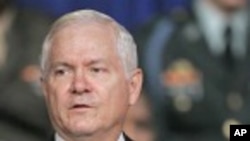Speaking to U.S. allies at a conference in Asia, U.S. Defense Secretary Robert Gates said today's challenges require civilized nations "to come together in new and dynamic ways -- as we are doing in Asia."
In particular, Mr. Gates cited the challenge of fighting terrorist networks that "have become adept at taking advantage of the ungoverned spaces of the real and virtual worlds to organize, train, and recruit." Terrorist organizations such as Abu Sayyaf and Jemaah Islamiyah in Southeast Asia, as well as Al-Qaida, seek to weaken states in order to achieve their radical goals.
The world has learned the hard way that allowing failed states to turn into terrorist sanctuaries can have catastrophic consequences. The most glaring example was Afghanistan, where Al-Qaida planned the September 11th, 2001, attacks on the United States. Today, a coalition of forty-two countries is working to ensure that Afghanistan never again becomes a terrorist safe haven.
The responsibility for success in Afghanistan rests with countries in Asia, as well as in NATO. And some have stepped forward. Having pledged nearly a billion and a half dollars, Japan is Afghanistan's third largest donor and is helping to build a network of roads.
Another large donor, India, is helping to build a new parliament building in Kabul. South Korea is providing assistance with a health center and reconstruction projects. Australia and New Zealand are also engaged in reconstruction efforts in Afghanistan.
But more help is needed. "I would encourage others to step forward with assistance to Afghanistan," said Defense Secretary Gates, "in the areas of governance, reconstruction, and counternarcotics." It is in the interest of the United States and its allies in Asia to help Afghanistan make the transition to a prosperous, secure, and sovereign nation.




